How Dangerous are Pigeon Droppings to Your Health?
The simple truth is the danger varies depending on the specific infestation. However, if you have a pigeon infestation of any size on your home or property, there is a real risk of contracting an illness from their droppings. The safe bet is to deal with your pigeon infestation as soon as possible to remove any risk of illness.
Pigeons can contract and carry many diseases and parasites which do end up in their droppings. When pigeons find a place on your roof or property to call home, they will quickly create a large mess of their own poop.
Typically at least one of two things are going to eventually happen with pigeons living on your property:
1. Pigeons will poop on your roof and mother nature will make sure that waste ends up on the ground, or in your bushes, trees, and plants. This has the danger of possibly getting tracked into your home by you, your family and even pets. This will cause any disease or even parasites in those droppings to end up right in your home.
2. The pigeons will find a comfortable place to nest and usually will just poop in one place. Those droppings will pile up on your roof or a ledge and will cause direct property damage. Droppings are very acidic and can destroy roofing materials and even damage solar panels. If you get a roof leak, rainwater can soak the droppings causing even more property damage. That tainted water will bring everything in their droppings right into your attic and anywhere the leak travels.
Disease are not, can we agree that having a bunch of bird poop on your property is just plain gross?
Speaking of diseases and parasites caused by pigeons, here’s the most common ones you should be concerned with…
Histoplasmosis
This is an infection that you can get from inhaling fungal spores that can grow on soil that contains pigeon poop. While not everyone that inhales these spores will contract histoplasmosis, having these spores on your property will put you and your family at constant risk for contracting this infection.
The symptoms from this infection can be very unpleasant and even dangerous to anyone who has a weakened immune system. The symptoms are usually flu like and include headaches, fever, a dry cough, and fatigue.
Histoplasmosis Capsulatum Sample
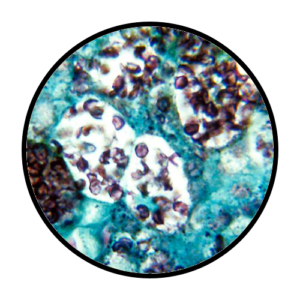
Candidiasis
This is another fungal infection that humans can contract that can be carried by pigeons. This infection is caused by over 20 species of a yeast known as Candida. A common area for infection is the mouth and throat and is commonly referred to as “thrush”. If can also effect skin, respiratory system, intestines, and urogenital tract . This particular infection can cause even more serious problems for women.
Candidiasis Sample
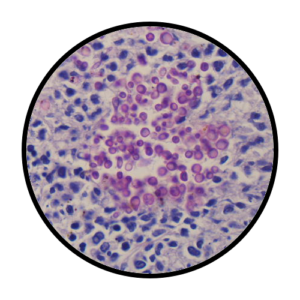
Cryptococcosis
This is yet another fungal infection carried by pigeons. While dangerous, it’s less likely to be contracted than the other two previously mentioned infections. This fungus typically lives in tropical and subtropical areas including the US Pacific Northwest. This infection can affect your lungs and nervous system.
Cryptococcus Sample
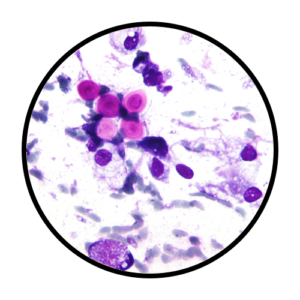
Psittacosis
This is sometimes known as “Parrot Fever” since in addition to pigeons, pet birds can carry this and is usually the most common known way of contracting this disease. Most people contract this disease from breathing in dust from dried bird poop or from dried discharge that come ooze from the bird’s beak and eyes. Symptoms can include cough, headache, and fever, and can even become a serious lung infection requiring medical attention.
Psittacosis Sample
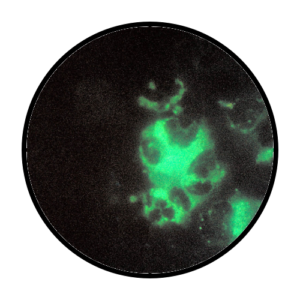
Encephalitis
This virus isn’t something that is contracted directly through pigeon droppings, it’s more of an indirect risk that comes from pigeons and other birds in general; but worth mentioning anyway. This is usually passed to humans through mosquitoes that have fed on a pigeon that has this virus and them bits a human thereby passing the virus on. Eliminating the pigeon population on your property can be effective in preventing this from happening. Also, it’s always a good idea to take preventative measures from getting bitten by mosquitoes in the first place.
Encephalitis Sample
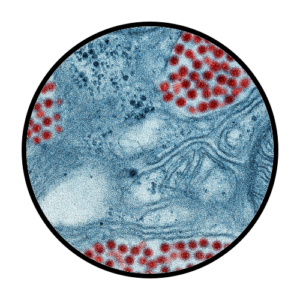
Salmonellosis
This is a potentially serious and even fatal infection that is caused from the Salmonella bacteria. The most common way of getting this infection is from under-cooked poultry and cross contamination in the kitchen. A more rare but very real scenario is humans contracting the infection from pigeons.
Pigeons with this bacteria in their systems can spread it though their droppings. Dust from the droppings can contain Salmonella and spread in many different ways. One problem is if the dust gets into a home or HVAC system it can be inhaled and cause infection.
Salmonella Sample
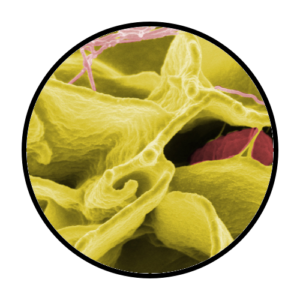
E.Coli
Otherwise known as Escherichia coli, is a bacteria that typically lives in the intestines of people and animals. Most E.coli are actually harmless, but some are pathogenic and can make humans ill. This bacteria can get into your body if you come in contact with any pigeons that carry it. Illnesses that come from E.coli can include diarrhea, urinary tract infections, pneumonia, respiratory illness, and others.
E.Coli Sample
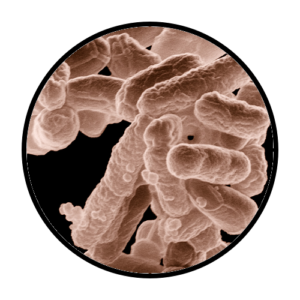
In addition to disease and infection, pigeons can also bring you parasites, ticks, and mites. This usually happens when the pigeons have established a nest and have create a large mess of droppings in an area. This is a breeding ground for all kinds of parasites and pests. A dead pigeon is even more of a breeding ground for pests and flies. Some of the more problematic insects include ticks, mites, bed bugs, and even lice. The more established the pigeon infestation, the greater danger of having these nasty little bugs get into your home.
Conclusion
Not only are pigeon droppings on your property gross, they actually carry significant risks to your health and even can cause property damage. The best thing you can do is to get rid of your pigeon problem, make sure all areas are properly cleaned, and measures are taken to prevent the birds from re-establishing a home on your property.
Sources:
https://www.cdc.gov/fungal/diseases/histoplasmosis/index.html
https://www.cdc.gov/fungal/diseases/candidiasis/index.html
https://www.cdc.gov/fungal/diseases/cryptococcosis-gattii/index.html
https://www.cdc.gov/museum/disease/psitt1.pdf
https://search.cdc.gov/search?query=Encephalitis&utf8=%E2%9C%93&affiliate=cdc-main
https://www.cdc.gov/salmonella/general/index.html
https://www.cdc.gov/ecoli/general/index.html